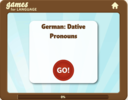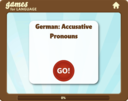
German Language Game: Dative Pronouns
Quick German Language Game: Dative Pronouns
Level: Elementary (A2)
Playing Time: 4 minutes
Here you can play a quick and fun German Language Game to learn and practice German Dative Pronouns:
• mir (to me)
• dir (to you, familiar)
• ihm (to him)
• ihr (to her)
• uns (to us)
• euch (to you-all)
• ihnen /Ihnen (to them /to you, formal)
1. Review the dative pronouns with the Shootout Game.
2. Recall basic nouns with the Memory Game.
3. Put together simple sentences using dative pronouns with the Word Invader Game.
4. Choose the translation of sentences with the Deal No Deal Game.
If you feel that you have a good understanding of the Dative pronouns and want to test your German vocabulary, just play the game. Otherwise, read on and then play.
Nouns
der Schlüssel - the key (m)
der Stadtplan - the city map (m)
Note: These masculine nouns will come up as direct objects (accusative case):
den Schlüssel, den Stadtplan
die Handynummer - the cell phone number (f)
die Adresse - the address (f)
die Zeitung - the newspaper (f)
die Wohnung - the apartment (f)
Note: Feminine nouns have the same article as subjects and direct objects: "die X."
das Buch - the book (n)
das Foto - the photo (n)
Note: Neuter nouns have the same article as subjects and direct objects: "das X."
Verbs
geben - to give
[ich gebe, du gibst, er/sie gibt, wir geben, ihr gebt, sie/Sie geben]
zeigen - to show
[ich zeige, du zeigst, er/sie zeigt, wir zeigen, ihr zeigt, sie/Sie zeigen]
Other Key Vocabulary
Kann ich ... geben? - Can I ... give? [können]
Geben Sie doch ... - Do give ... [imperative, formal]
warum - why
sie wollen - they want [wollen]
If you like our games, please SHARE us with your friends.
More Than a German Language Game
Remember: You can learn and practice German online for FREE with our 36-Scene German 1 Story: "Michael in Deutschland" and our 72-Scene German 2 Mystery Story Sequel: "Blüten in Berlin?"
("Blüten" means blossoms in German - but you'll find out that it has another, darker meaning).
Just login HERE.
And, if you have any language questions - don't hesitate to contact us!

German Language Game: Accusative Pronouns
German Language Game - accusative pronouns
Level: Elementary (A2)
Playing Time: 4 minutes
Play a fun and quick German Language Game to learn and practice German Accusative Pronouns:
• mich (me)
• dich (you, familiar)
• ihn (him)
• sie (her)
• uns (us)
• euch (you-all)
• sie /Sie (them /you, formal)
1. Review the accusative pronouns with the Shootout Game.
2. Recall basic verbs that take the dative (a direct object).
3. Put together simple sentences using accusative pronouns with the Word Invader Game.
4. Choose the translation of sentences with the Deal No Deal Game.
If you understand accusative pronouns as direct objects and want to try out your German vocabulary, just play the game. Otherwise, read on below and then play.
Verbs with a Direct Object
sehen - to see
[ich sehe, du siehst, er/sie sieht, wir sehen, ihr seht, sie/Sie sehen]
kennen - to know, be acquainted with
[ich kenne, du kennst, er/sie kennt, wir kennen, ihr kennt, sie/Sie kennen]
suchen - to look for
[ich suche, du suchst, er/sie sucht, wir suchen, ihr sucht, sie/Sie suchen]
anrufen - to call (a *separable-prefix verb)
[ich rufe an, du rufst an, er/sie ruft an, wir rufen an, ihr ruft an, sie/Sie rufen an]
Separable Prefix Verbs
These are verbs that separate into two parts when used in the present and simple past tenses, as well as in the imperative.
For instance, the verb "rufen" (to call, shout) can add the separable prefix "an-".
The verb "anrufen" means "to call", specifically by telephone).
The prefix "an" goes to different positions, depending on the tense or mood of the verb. For example:
Present tense, Simple Past, and Imperative - the prefix goes at the end:
• Ich rufe dich sofort an.
(I'm calling you right away.)
• Er rief gestern sehr spät an.
(He called very late yesterday.)
• Ruf mich bitte an.
(Please call me.)
Future tense, and Present Conditional - the prefix stays attached:
• Ich werde dich heute Nachmittag anrufen.
(I'll call you this afternoon.)
• Ich würde dich gerne anrufen.
(I would like to call you.)
Perfect Tenses - the prefix stays attached to the past participle:
• Ich habe dich gestern angerufen.
(I called you yesterday.)
If you'd like a more detailed explanation of Separable and Inseparable Prefix Verbs, click here.
And, if you like our games, please SHARE us with your friends.
More Than a German Language Game
Remember: You can learn and practice German online for FREE with our 36-Scene German 1 Story: "Michael in Deutschland" and our 72-Scene German 2 Mystery Story Sequel: "Blüten in Berlin?"
("Blüten" means blossoms in German - but you'll find out that it has another, darker meaning).
Just login HERE.
And, if you have any language questions - don't hesitate to contact us!
German Language Game: Geben - Present Tense
Quick German Language Game: geben (to give) - present tense.
Level: Elementary (A2)
Playing Time: 4 minutes
Learn and practice the present forms of "geben" with this fun interactive online game.
Present Tense: stem vowel changes: du, er/sie/es = "i"; all others = "e" (including the formal "Sie")
"Geben" + indirect object (give "to whom"): Ich gebe dir ... (I give [to] you ...).
"Geben" + direct object (give "what"): Ich gebe das Geld. (I give the money.)
Present Tense of "geben"
ich gebe - I give
du gibst - you give
er/sie/es gibt - he/she/it gives
wir geben - we give
ihr gebt - you-all give
sie/Sie geben - they/you(form.) give
Idiomatic expressions
es gibt - there is
Was gibt's? - What's up?
Indirect Pronoun Objects - give "to whom":
mir - (to) me
dir - (to) you [familiar]
ihm - (to) him/it
ihr - (to) her
uns - (to) us
euch - (to) you-all
ihnen/Ihnen - (to) them/you (formal)
Direct Objects - give "what":
Ich gebe dir den Kaffee. - I give you the coffee. [der Kaffee, masculine]
Ich gebe dir die Adresse. - I give you the address. [die Adresse, feminine]
Ich gebe dir das Geld. - I give you the money. [das Geld, neuter]
Short Sentences: "Geben" + Ind. and Dir. Object
Wir geben ihr die Adresse. - We give her the address.
They give us the money. - Sie geben uns das Geld.
Ich gebe dir den Kaffee. - I'll give you the coffee.
Kannst du mir das Geld geben. - Can you give me the money?
Sie gibt ihnen den Kaffee. - She gives them the coffee.
Es gibt kein Geld. - There's no money.
You'll find more in our post: How to Use the German Modal Verb "Können"
If you like our games, please SHARE us with your friends.
More Than a German Language Game
And don't forget: You can practice German online for FREE with our 36-Scene German 1 Story: "Michael in Deutschland" and our 72-Scene German 2 Mystery Story Sequel: "Blüten in Berlin?".
(If you already know that "Blüten" means blossom in German - you'll learn that Blüten has still another meaning...).
Just login HERE.
If you have any language questions - don't hesitate to contact us!

German Language Game: Jetzt sollten wir...
Quick German Language Game: "Jetzt sollten wir..." - (Now we should...)
Level: A2 Elementary
Playing Time: 3 1/2 Minutes
A quick game to practice the German Conditional form "sollten" (should).
This quick language game also gives you some practice with simple German Word Order.
Playing this game won't make you a word order expert, but it will certainly help you understand basic patterns.
Even if you know the word-order "rules", using them while you talk takes plenty of practice.
Basic word order patterns
Renate;;Jetzt sollten wir ans Mittagessen denken.
Karl;;Ich sollte eine Pizza bestellen.
Michael;;Claudia, du solltest den Tisch decken.
Jetzt sollten wir ans Mittagessen denken.
(Now we should think of lunch.)
Note: In a basic German sentence, the verb is in 2nd position, vs English.
Ich sollte eine Pizza bestellen.
(I should order a Pizza.)
Note: In German, the "infinitve" goes to the end of the sentence, vs English.
Claudia, du solltest den Tisch decken.
(Claudia, you should set the table.)
Note the position of the German infinitive, vs English.
Words in German Language Game
- wir sollten - we should [sollen]
- jetzt - now
- ans Mittagessen - (think) about lunch
- denken - to think
- ich sollte - I should
- eine Pizza- a pizza
- bestellen - to order
- du solltest - you should (familiar)
- den Tisch - (set) the table
- decken - to set
If you like our games, please SHARE us with your friends.
More Than a German Language Game
And don't forget: You can practice German online for FREE with our 36-Scene German 1 Story: "Michael in Deutschland" and our 72-Scene German 2 Mystery Story Sequel: "Blüten in Berlin?"
(If you already know that "Blüten" means blossom in German - you'll learn that Blüten has still another meaning.)
Just login HERE.
If you have any language questions - don't hesitate to contact us!

German Language Game: Ja gerne
Quick German Language Game: "Ja gerne!" - (Yes, I'd like to!)
A quick online German game to learn and practice 8 conversational words and phrases.
Say the words and phrases OUT LOUD, right after or along with the speaker.
That's a great way to sharpen your pronunciation and to internalize idiomatic expressions.
For example, a standard expression such as:
Wir können uns treffen. [We can meet.]
Ja, gerne. [Yes, I'd like to."
NOTE that "studieren" means "to study at a university or college".
Studierst du? [Do you go to university? (fam.)]
Gehst du in die Schule? [Do you go to school? = grade, middle or high school].
Words in German Language Game
- studieren - to go to university or college
- studierst du? - do you go to university? (fam.)
- hier in Heidelberg - here in Heidelberg
- ich studiere in München - I go to university in Munich
- vielleicht - perhaps
- sich treffen - to meet each other
- vielleicht können wir uns treffen - perhaps we can meet each other
- Ja gerne! - Yes, I'd like to!
If you like our games, please SHARE us with your friends.
More Than a German Language Game
And don't forget: You can practice German online for FREE with our 36-Scene German 1 Story: "Michael in Deutschland" and our 72-Scene German 2 Mystery Story Sequel: "Blüten in Berlin?".
(If you already know that "Blüten" means blossom in German - you'll learn that Blüten has still another meaning...).
Just login HERE.
If you have any language questions - don't hesitate to contact us!
